One of the things I was super excited about when I started this newsletter was something I’m obviously calling “Eating Pizza With a Cool Person”. The idea is pretty simple: I reach out to someone I admire who is doing helpful, unique or interesting things in Chicago, offer to take them out for pizza, and we have a conversation.
Tim Giuffi is a home baker extraordinaire who started his small batch bakery — called Lyman Ave. Bread — in the kitchen of his house back in 2018.
Tim makes artisan sourdough loaves that he sells every Saturday morning at the Oak Park Farmers’ Market, and he also offers a local subscription service where he’ll deliver bread straight to your front door with the help of his cargo trike (but only if you live south of Madison Street in Oak Park).
Tim is a lot more than just the “neighborhood bread guy” as he likes to be called, as he’s frequently cooking and baking all kinds of delicious things — some of which he’ll offer up at the various local pop-ups you can catch him selling at from time to time.
I met Tim at one such pop-up, and it was obvious to me immediately that not only do we share the same affinity for pizza, but also that he would have a lot of really interesting things to say. He didn’t have any sourdough loaves left (he typically sells out of those right away), so I had to “settle” for a ham and cheese croissant instead, which I’m still thinking about almost four months later.
We went to his favorite pizza place, Coalfire in West Town, where we split two pies: an Ezzo pepperoni and a meatball (FYI it’s scientifically impossible to take an appetizing photo of a meatball pizza), and talked about pizza making, baking, running a small business, and some issues he sees within the current state of the Chicago restaurant industry.
CPN: So where did you grow up?
Tim: I grew up in Brooklyn, New York, in a part of Brooklyn called Bensonhurst, which is an Italian-American neighborhood.
CPN: What was your first favorite pizza?
Tim: Trying to think about it, the pizzas near my house were just all your classic, New York-style pizzas. Anyone you went to, they were all kind of the same. But still, that’s my Platonic ideal of pizza.
CPN: And how did growing up in New York affect the way you think about pizza?
Tim: I mean, I don’t like other kinds of pizza. Being out here in Chicago is hard, because I just don’t like most of the pizza. I don’t like deep dish. Or tavern-style.
CPN: You don’t like tavern-style at all?
Tim: I can see liking it if I had a good one. I don’t think I’ve ever had a good one. I kind of feel they’re often like, toppings on a piece of cardboard. Like they forgot the crust and just served me the toppings on the box for the pizza. But I can see it being good. What’s a good one?
CPN: There’s a place in River Forest called Bertolli’s. We get delivery from them.
Tim: I had Bertolli’s. That was our first pizza here in Chicago, so in like 2014. And I didn’t like it. And I thought it was so weird that in came in a bag. I went down to get the pizza, and I didn’t see a box, and I was like, “What’s going on?” And then I was handed this flimsy bag. And I didn’t love it. But that’s the only time I’ve had it.
CPN: Have you had bagged pizza again since then?
Tim: No.
CPN: It keeps better than a box. And it travels much better.
Tim: I feel like that depends on the pizza. It probably works better for tavern. But for a New York pizza? That wouldn’t work.
CPN: No. It would not work for New York pizza. So you have some family history with pizza…
Tim: Not so much, really. Just that my brother worked in my uncle’s pizzerias. But they were sort of a separate part of the family. My uncle lived in Colorado. But we still lived in Brooklyn, and my brother moved out there to go work for him. But that didn’t involve me at all.
CPN: Didn’t your brother open a pizzeria?
Tim: He did. In Philly. Called Square Pie. And he sold it just a couple of months ago, probably right after we first talked, actually.
CPN: Do you feel like having someone who makes pizza in your family affects the way you think about it?
Tim: Not really. We ate the pizza we ate, and his pizza was so different anyway. I got into dough and stuff independent of that. And I think that shaped more of how I feel about pizza than just the fact that my brother made it.
CPN: How did that shape the way you feel about pizza? When you started to do your own dough…
Tim: Just knowing what goes into it and everything. The intricacies. Pizza is maybe the biggest rabbit hole of any kind of baking. Where you put the stone in your oven. Which level is it on. Whether you’re using a steel. Do you turn the broiler on? Every single thing affects it. But it’s so much fun. And that makes me appreciate these kinds of places even more. To bang it out consistently? I wish I could do that.
CPN: Do you remember the first time you had Coalfire?
Tim: It was February 2020. We came in, me, and my wife, and my daughter. And we actually sat at this very table. I don’t remember what pizzas we had, but I do remember thinking this is the best pizza I’ve had in Chicago so far. I made plans to come back with my daughter during spring break. We were going to go, there’s an outside art museum just down Chicago Avenue, and we were going to take the Blue Line in and go there then come here. That was the week the world shut down. That very week.
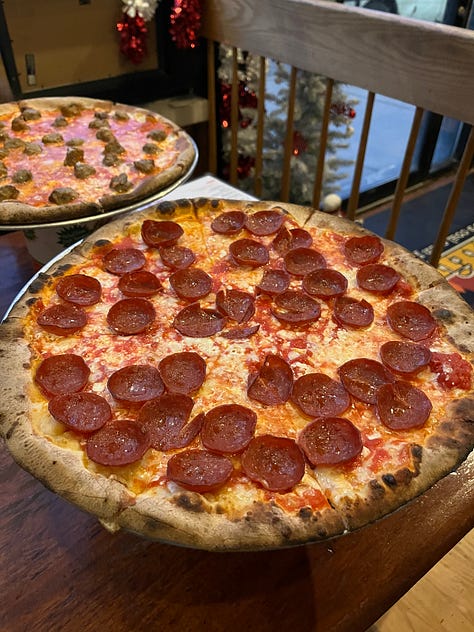
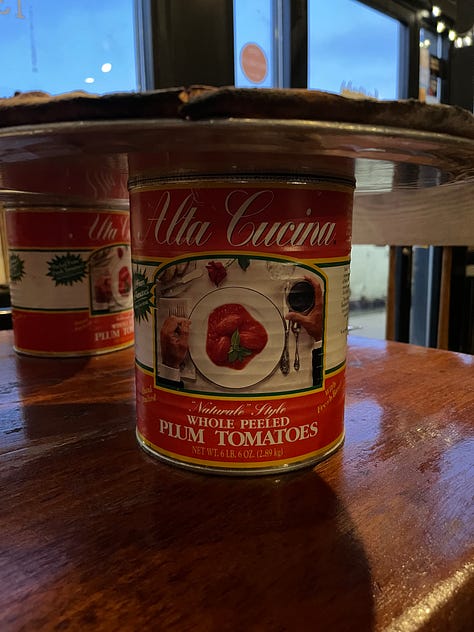
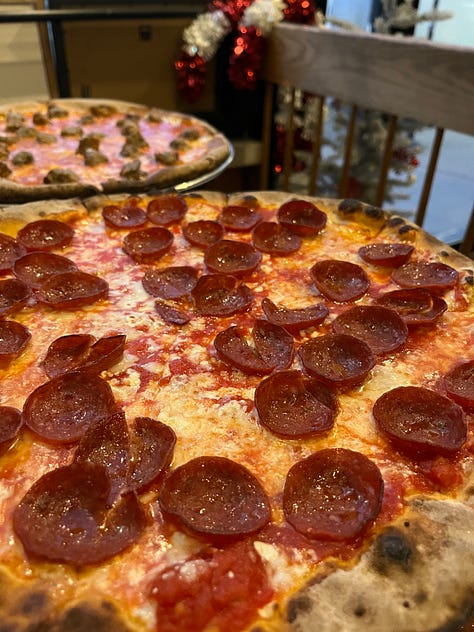
CPN: How did you hear about Coalfire in the first place?
Tim: That’s a good question. I don’t actually know. Probably just social media.
CPN: Why is it your favorite pizza in Chicago?
Tim: It kind of reminds me of the pizza from home, but a bit more elevated. It’s hard to classify what kind of pizza it actually is. “New York Elite”, have you heard that term?
CPN: No.
Tim: So, the Pizza Making forum…do you ever go on there, by the way?
CPN: For sure.
Tim: It’s a term they use, and I don’t know if it’s used outside of that. It refers to the coal-fired places in New York, like Lombardi’s. And I think this is kind of similar to that. Even though that wasn’t really what I grew up with, I grew up with, like, the street slice. But it’s familiar. And it’s cool, because they use local producers and everything, and they list all of them right there (Editor’s note: Tim was gesturing to Coalfire’s menu at this point, which contains a list of all the local merchants that supply the restaurant with ingredients).
CPN: So we’ll transition a little bit then, what do you love about Chicago as a city? And you’re the first person I’m talking to in this capacity that didn’t grow up here, so this will be interesting.
Tim: That’s right, I didn’t grow up in Chicago. I don’t feel like I know Chicago all that well, actually, so I’m trying to think.
CPN: You can count Oak Park as part of Chicago to serve the purpose if you want to.
Tim: But Oak Park is not part of Chicago, though. Oak Park totally doesn’t count.
CPN: It’s funny, when I talk to people in the suburbs outside Chicago, they treat it like it’s a part of Chicago. But if you talk to anybody in Chicago, they’re like, NO. Oak Park and Evanston? No.
Tim: People don’t know what Oak Park is. Like if I meet somebody random and they say, where are you from? And I say Oak Park, they’re not going to have a clue what I’m talking about. So I have to tell them Chicago. And I live two blocks from Chicago.
CPN: Same. So do we.
Tim: It’s a hard question for me, though. As a place to live? I’ll think about it.
CPN: The follow-up to that is, what do you think could make it better? But if you don’t know what you like, I don’t know what you would think could make it better?
Tim: So one thing I find weird about Chicago and restaurants, and this is another thing I like about Coalfire too, is that everything seems to be owned by a group. And there aren’t that many small, independent places. I mean, there probably are. I just don’t know about them.
CPN: Because the group ownership ones are the places you hear the most about.
Tim: And that’s something I want different. I want mom and pop. I don’t want to go to a place that has 20 restaurants. Does a bakery need to have a CEO? I don’t know.
CPN: I’m sure that there are groups in New York, but I don’t feel like you hear about them the way you do here.
Tim: Philly was similar. These days, going back, now everything is a part of a group. But 10 years ago, when we left, it was a lot easier to find a small place.
CPN: Have you always been a baker?
Tim: I started baking when my daughter was born, because I stayed home and I had nothing to do. So it was a hobby to pick up. Kind of similar to how everybody started baking during COVID. I suddenly have a lot of time on my hands, let me figure something out. And it was a good way to save money. We were spending, whatever, eight dollars a week on bread from a bakery. I could get that cost down to 50 cents a week by learning how to make it.
CPN: And have better bread, probably.
Tim: The rabbit hole started. Same with pizza. There’s so much to learn that you can easily become obsessed with it.
CPN: So you started out baking bread?
Tim: I had a little stint in my early 20s where I made bread, so I was somewhat familiar with it. But in 2014 I was 30, so about ten years later, and that was when I made a sourdough starter and tried to figure the whole thing out.
CPN: The last few years there seems to have been a boom on all sorts of businesses that started off with people baking in their homes. Whether that’s pizza, or bagels, or bread. Why do you think that is?
Tim: I think that touches on what I was saying about Chicago. People want small. From a customer perspective, they want to support the small artisan. But also, you have people who have the talent, but they’re working for somebody else. But then they figure out how they can make it from home. It’s hard though. It’s hard to make any money baking from your house. It’s a quantity game that you can’t really achieve when you’re in an apartment or whatever. So there’s that part, maybe the most difficult aspect as well. And also just the grind has everybody down. “I don’t want to get up and go work for you. So maybe my neighbors will buy my bread.” I think that’s a big part of it. And I’m sure COVID added so much to that as well. You’re stuck at home. You already had the talent to make those cupcakes, so you started making more. And then people were like, I’ll buy these. And maybe you expand to a brick and mortar. I don’t know. That’s not my wheelhouse.
CPN: You can see that now with a lot of pizza here. Milly’s started in a ghost kitchen. Kim’s Uncle was out of their apartment at first. And now they’re going for it. What made you want to start doing your own bread business from your house?
Tim: Basically because my kid was about to start kindergarten. I needed something to do. I could go back and work in restaurants, but I didn’t really want to. So why not just give it a shot and try to sell some bread? My neighbors were already on board. And they were the most important aspect of it too, because there was already somewhat of a customer base. They has been getting their bread for free for a while at this point. Because that’s who you practice on. You don’t make one loaf of bread. You don’t make a dozen cupcakes. You make more than that, because you need to practice. And you give it to your neighbors, because you can’t eat more than a dozen cupcakes, you know?
CPN: When you first started was there someone you were trying to emulate? Some person or business that you looked at like, I would like to do something in that vein.
Tim: So Instagram was really helpful with that. There was already a pretty hardcore baking community on there and a lot of people had cottage businesses and seemed to be doing pretty well. So it was like, I could do that. I don’t think there was anybody specific, it was more of a hive mind type of thing than one individual.
CPN: What are some of the major challenges you encounter running a home bakery?
Tim: The home is the biggest challenge. Having the right equipment. I have one refrigerator, a regular, old refrigerator that I can fit 40 loaves of bread in. So that’s it. I’m capped out at 40. So space is a huge issue. Doing dishes. Doing dishes is, by far, the worst possible thing to try and do in my kitchen sink without any space to put any of the things I just washed. You wouldn’t think about that, but that’s one of the worst things. All the dishes.
CPN: I know from making a few pizzas in my house once a week how much of a mess that can cause. Are you constantly doing dishes?
Tim: It’s constant. And they’re all large. It’s not like, a small mixing bowl. It’s a large bus tub because you’re making a lot of bread. So I have to find someplace to put those clean bus tubs now. Should I hire a dishwasher for one day a week?
CPN: Might not be a bad idea. Inversely, what are some of the best things about making and selling your own bread?
Tim: The answer is exactly the same, I’m at home. I can live my life exactly as I’m living it, just with baking the bread in-between. I time it so I can go pick up the kid from school. This is a good and a bad thing, but when I’m really busy for the farmers market I’ll wake up at 4 o’clock in the morning, go down to the basement, and get a load of bread in the oven before I’ve done anything else. And that’s a good thing because now I’ve got a head start on it. But it’s also a bad thing because my work day just started five minutes after I woke up. But being inside my house is really nice. There’s a lot of down time with baking too. So I can go sit and watch TV and I don’t feel the need to be doing anything else either, because I’m not paying rent.
CPN: Tell me about your sourdough. When did it start? How did you start it?
Tim: Same time as I started baking. When my kid was born and I stayed home I started the starter. And I started with sourdough because sourdough pizza really interested me for some reason. I had never had it before. I didn’t really know about it. But I ran across this Serious Eats article that took me through it, and I followed their method for making the starter. It’s the only one I’ve ever made, so I have no advice on how to make a sourdough starter. I made it ten years ago and I’ve been using it since. And I went back and I can’t find the instructions. Some of it’s still there, but it was multiple pages. Like, “here’s what you do on day two!” Not all of it’s there anymore.
CPN: How did you get into the farmers market?
Tim: I was always worried about the farmers market, because I didn’t think I’d be able to do enough to make it worth it. So I first contacted them in 2019 just to see if I could get in after all the other bread sold out. “Can I show up at 11 o’clock?” But they never got back to me. Once I had the production there I just randomly applied. I didn’t know anybody or anything. And they let me in.
CPN: What year did you start?
Tim: This will be my third year, so 2022.
CPN: What was it like when you first started?
Tim: Way busier than I thought it was going to be. Going to a farmers market, and I’m sure this is true of all of them, when you’re there shopping you just get that one little 15 minute slice. You don’t necessarily think it’s like that for four hours. So it’s a few thousand people that come through the farmers market. Which you can’t really envision as a shopper.
CPN: Are there regulars?
Tim: Oh, yeah. Most, I’d say. At least the people that shop from me.
CPN: Are there weird regulars?
Tim: What do you mean?
CPN: My mom used to take us for the donuts when we were kids and there was sort of a…renaissance fair vibe. There used to be this band of men playing lutes. And they’d wear elf hats.
Tim: That’s pretty cool. No one’s really like that. They’re normal Oak Park-ers. Mostly elderly people.
CPN: The ren fair crowd is gone now?
Tim: I wish they weren’t. That would be fun. People should still do that.
CPN: When did you start doing deliveries?
Tim: So that came about by accident. The original plan was just to exist like, south of the highway. And I would deliver down there because I was going to walk my deliveries. I never really expected to do it for more than 12 people. But then I found the cargo trike on Craigslist for $200 and I snatched that immediately. And that really changed the whole face of the business. I was able to extend the area all the way up to Madison Street. And that’s almost half the village. People would contact me, and I was written up in The Wednesday Journal a few times, to say, “How do I get your bread?” And I’d say, “Do you live north of the highway?” Because then you don’t.
CPN: How did you start selling at Carnivore (a local high-end butcher and market in Oak Park)?
Tim: I went in there one day and they recognized me and asked if they could get some baguettes. And that was just before New Year’s Eve in 2021. So I’ve been selling to them for more than two years now, just because of a random encounter.
CPN: Do they sell out?
Tim: I don’t know, actually. And that’s sort of a weird thing too, because every other aspect of it I’m so involved in. But for me that one ends when I drop it off. I don’t know what happens to it after that. I don’t know how they store it. I don’t know anything.
CPN: On your busiest week how much bread are you making then?
Tim: About 150 pieces. And that’s all inclusive, like pastries too. That’s a typical farmers market.
CPN: I wanted to ask about that too. In addition to the bread, what are some of your other favorite things that you make and sell?
Tim: I really like these ham and cheese croissants that I make, but I can’t sell them there. I make pop tarts for the farmers market, and that’s fun. Some local fruit. Some puff pastry. There’s nothing to it.
CPN: Do you have an all-time favorite bread or bakery?
Tim: Just a classic, country sourdough is my all-time favorite bread. I don’t see the point of any other kind of bread. And I don’t really have like an all-time favorite bakery. I can’t think of it. I go to bakeries now and I love to buy other people’s bread. But there’s nothing where I’m like, that’s the best bakery I’ve ever been to.
CPN: What do you look for now that you’ve gone down the rabbit hole, and you know a lot more about bread and baking?
Tim: It’s horrible to say, but I just look for my bread. I’ve managed to make my bread exactly how I want it. So I look for things that are comparible to it. And I often don’t like other people’s bread because it’s not mine. Even though it’s perfectly fine, I’m just like, this isn’t mine. This isn’t what I want.
CPN: Because you’ve tailored your bread specifically to your tastes.
Tim: Slowly over time. I didn’t set out knowing what I was looking for. It just sort of happened. You make little changes and then you’re like, oh, I like that better. And obviously I’m not saying my bread is the best bread. That’s ridiculous. I just enjoy it. It’s like a New York slice of pizza to me. That’s what I’m looking for.
CPN: Do you feel obligated to make it all the time? Do you still enjoy making it, like if you aren’t making it for production to sell?
Tim: I just baked for the first time in a month today. And that was fun. But when you’re doing it every day for six months straight it’s a lot. So taking a break is probably a good thing.
CPN: Last question, do you have any advice for someone who wants to do what you do?
Tim: If you think a product is good, just do it. There’s no secret to it. It’s so small scale. You’re not looking to sell 100 loaves of bread. You should be looking to sell six loaves of bread. Give it away. Whatever. Just make the bread and let it build from there. I got lucky in that I put literally no effort into this business, and it managed to take care of itself. And I know that can’t happen for everybody. I somehow wrote a book. Like, how did that happen?
CPN: Yeah! Tell me about the book?
Tim: No. I hate the book.
I was going to link to Tim’s book, but I have a sneaking suspicion he would prefer that I didn’t.
To find out more about Tim, and how you can get his bread, you can follow him on Instagram at Lyman Ave. Bread.


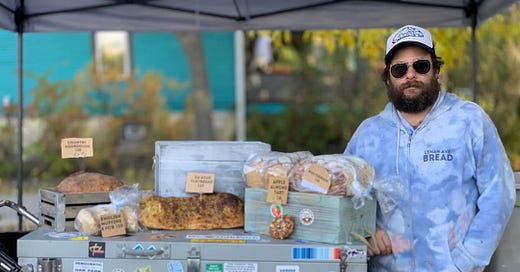


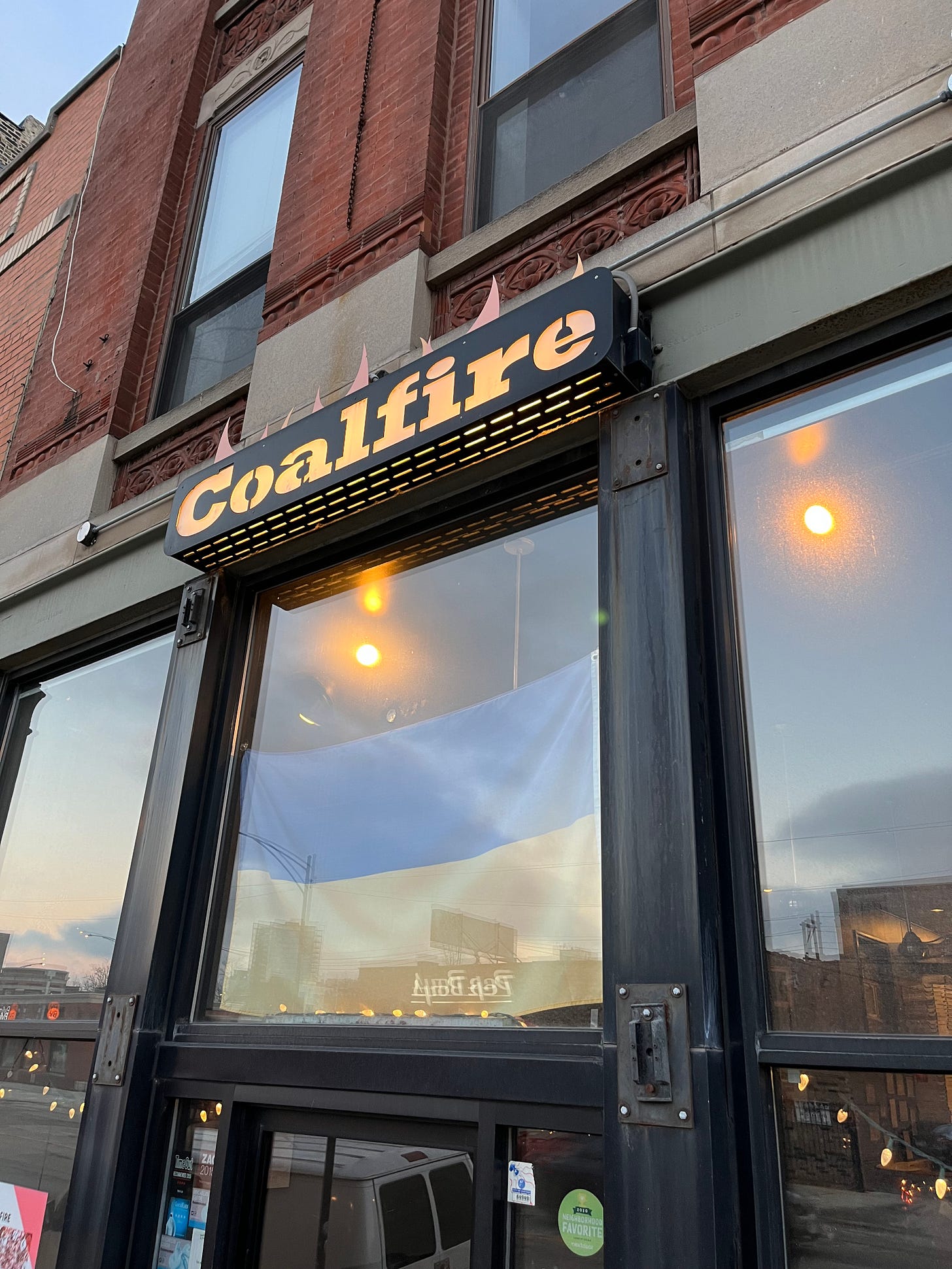



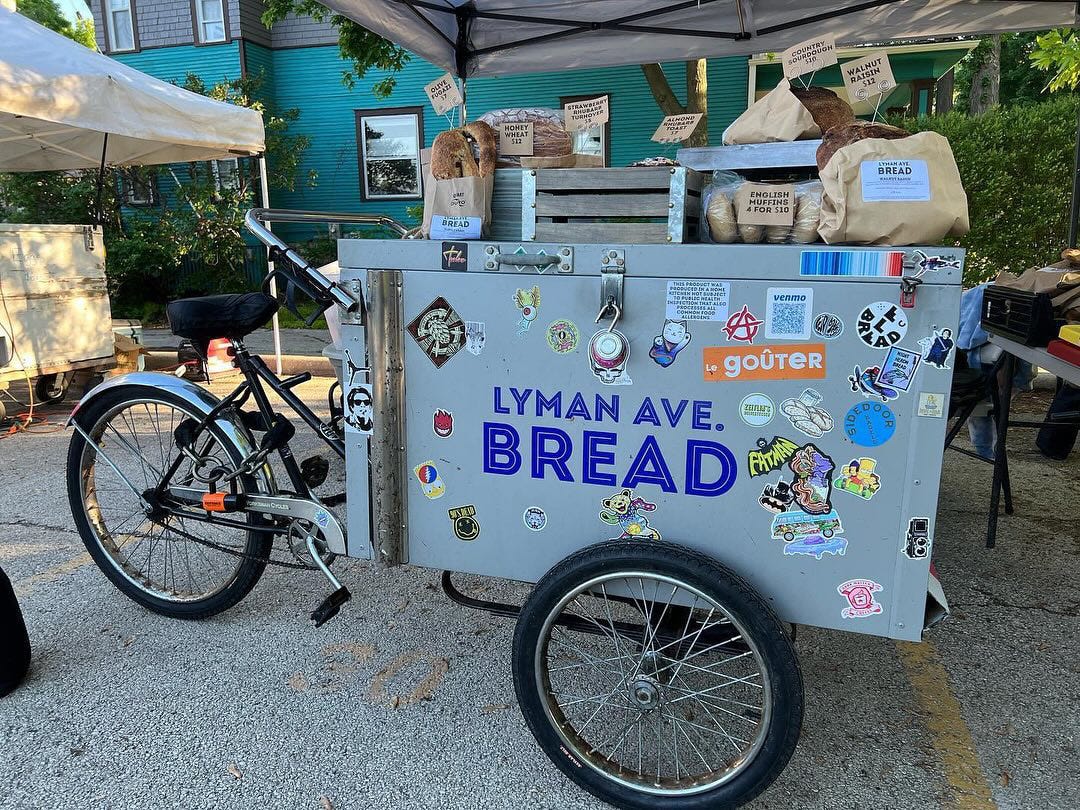
I like to think "I hate the book!" was the last thing either of you said before eating pizza in silence. But I've been watching a lot of A24 movies lately.